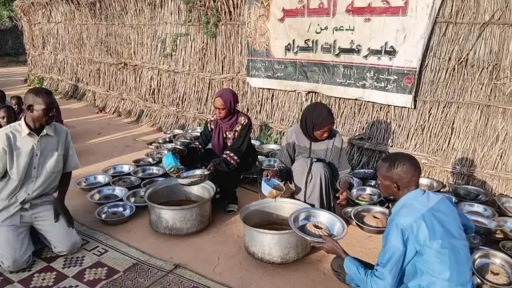Surviving on meager amounts of animal feed ground into a porridge and risking murder, rape, abduction, and torture, journalists struggle to continue reporting in El Fasher, capital city of Sudan’s North Darfur state.
Famine is closing in on El Fasher, walled off for the most part by earthen structures raised by the paramilitary Rapid Support Forces (RSF), which has besieged the city for the last 16 months, cutting off its population from food and aid from outside.
“Prices for what little food remains are astronomical,” the Committee to Protect Journalists (CPJ) said in a report on Wednesday, October 1. A kilogram of sugar – costing two US dollars before this war between the RSF and Sudanese Armed Forces (SAF) started in April 2023 – “now costs … USD 28”, while rice and flour sell at “USD 80 a kilo”.
Under the circumstances, ambaz, a type of animal fodder made of peanut shells – which nutrition experts warn is unsafe for long-term consumption – has become the staple for its residents.
“Journalists told CPJ they experienced severe diarrhea, malnutrition, and poisoning” from consuming it, the report added. “People are literally dying from what they are forced to eat,” Jehaad Albadwe, one of the journalists interviewed, told the CPJ. Weakened by hunger, many have been forced to stop their work.
The surviving journalists who continue working are being hunted down. “It was some people who knew me who ratted me out to RSF. Informants are everywhere. They give journalists up in exchange for protection or money,” said a journalist who reported being tortured.
Women journalists suffer additionally. One female journalist was beaten and gang-raped when the RSF stormed her neighborhood and went door to door. She told the CPJ, “This was not random violence. This was punishment because of my work.”
“I had no access to emergency contraception, no antibiotics, no painkillers,” she said, adding that she was “lucky to escape El-Fasher, but in my current location, none of these things are available. I still don’t know if I am pregnant, and there isn’t a single doctor around to examine me.”
With no supply of sanitary pads, “We use makeshift cloths from headscarves to make it through our [menstrual] cycles,” said another. “It is humiliating … You can’t stand in the street to report like this.”
Against these odds, “we still report. Our voices are the only thing left,” added another. However, lack of internet and electricity supply means, “We can no longer cover the war live,” said Lana Hassan, who escaped from the city six months ago with a bullet wound in her leg. “We write, and when things calm down, we can publish, but the news is never timely. This is a tactic to silence us and keep El Fasher away from the news.”
The post “Hunted, raped, starved”: CPJ’s chilling report on journalists in Sudan’s El Fasher appeared first on Peoples Dispatch.
From Peoples Dispatch via this RSS feed


